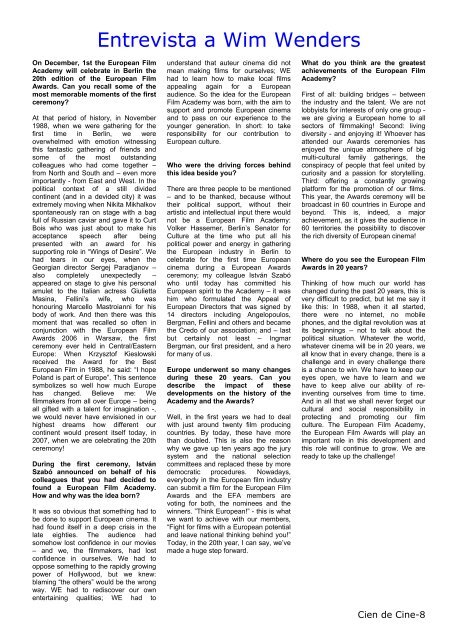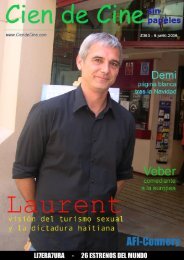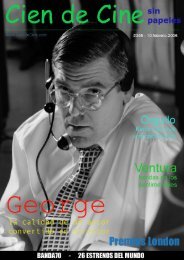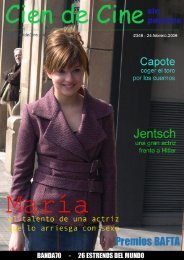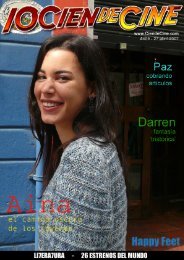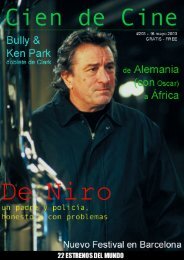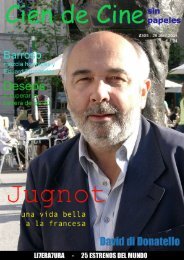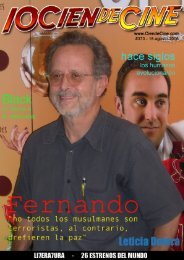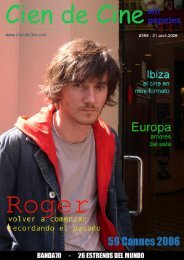Sin ayudas, por la cara - Cien de Cine
Sin ayudas, por la cara - Cien de Cine
Sin ayudas, por la cara - Cien de Cine
You also want an ePaper? Increase the reach of your titles
YUMPU automatically turns print PDFs into web optimized ePapers that Google loves.
On December, 1st the European Film<br />
Aca<strong>de</strong>my will celebrate in Berlin the<br />
20th edition of the European Film<br />
Awards. Can you recall some of the<br />
most memorable moments of the first<br />
ceremony?<br />
At that period of history, in November<br />
1988, when we were gathering for the<br />
first time in Berlin, we were<br />
overwhelmed with emotion witnessing<br />
this fantastic gathering of friends and<br />
some of the most outstanding<br />
colleagues who had come together –<br />
from North and South and – even more<br />
im<strong>por</strong>tantly - from East and West. In the<br />
political context of a still divi<strong>de</strong>d<br />
continent (and in a <strong>de</strong>vi<strong>de</strong>d city) it was<br />
extremely moving when Nikita Mikhalkov<br />
spontaneously ran on stage with a bag<br />
full of Russian caviar and gave it to Curt<br />
Bois who was just about to make his<br />
acceptance speech after being<br />
presented with an award for his<br />
sup<strong>por</strong>ting role in “Wings of Desire”. We<br />
had tears in our eyes, when the<br />
Georgian director Sergej Paradjanov –<br />
also completely unexpectedly –<br />
appeared on stage to give his personal<br />
amulet to the Italian actress Giulietta<br />
Masina, Fellini’s wife, who was<br />
honouring Marcello Mastroianni for his<br />
body of work. And then there was this<br />
moment that was recalled so often in<br />
conjunction with the European Film<br />
Awards 2006 in Warsaw, the first<br />
ceremony ever held in Central/Eastern<br />
Europe: When Krzysztof Kieslowski<br />
received the Award for the Best<br />
European Film in 1988, he said: “I hope<br />
Po<strong>la</strong>nd is part of Europe”. This sentence<br />
symbolizes so well how much Europe<br />
has changed. Believe me: We<br />
filmmakers from all over Europe – being<br />
all gifted with a talent for imagination -,<br />
we would never have envisioned in our<br />
highest dreams how different our<br />
continent would present itself today, in<br />
2007, when we are celebrating the 20th<br />
ceremony!<br />
During the first ceremony, István<br />
Szabó announced on behalf of his<br />
colleagues that you had <strong>de</strong>ci<strong>de</strong>d to<br />
found a European Film Aca<strong>de</strong>my.<br />
How and why was the i<strong>de</strong>a born?<br />
It was so obvious that something had to<br />
be done to sup<strong>por</strong>t European cinema. It<br />
had found itself in a <strong>de</strong>ep crisis in the<br />
<strong>la</strong>te eighties. The audience had<br />
somehow lost confi<strong>de</strong>nce in our movies<br />
– and we, the filmmakers, had lost<br />
confi<strong>de</strong>nce in ourselves. We had to<br />
oppose something to the rapidly growing<br />
power of Hollywood, but we knew:<br />
b<strong>la</strong>ming “the others” would be the wrong<br />
way. WE had to rediscover our own<br />
entertaining qualities; WE had to<br />
Entrevista a Wim Wen<strong>de</strong>rs<br />
un<strong>de</strong>rstand that auteur cinema did not<br />
mean making films for ourselves; WE<br />
had to learn how to make local films<br />
appealing again for a European<br />
audience. So the i<strong>de</strong>a for the European<br />
Film Aca<strong>de</strong>my was born, with the aim to<br />
sup<strong>por</strong>t and promote European cinema<br />
and to pass on our experience to the<br />
younger generation. In short: to take<br />
responsibility for our contribution to<br />
European culture.<br />
Who were the driving forces behind<br />
this i<strong>de</strong>a besi<strong>de</strong> you?<br />
There are three people to be mentioned<br />
– and to be thanked, because without<br />
their political sup<strong>por</strong>t, without their<br />
artistic and intellectual input there would<br />
not be a European Film Aca<strong>de</strong>my:<br />
Volker Hassemer, Berlin’s Senator for<br />
Culture at the time who put all his<br />
political power and energy in gathering<br />
the European industry in Berlin to<br />
celebrate for the first time European<br />
cinema during a European Awards<br />
ceremony; my colleague István Szabó<br />
who until today has committed his<br />
European spirit to the Aca<strong>de</strong>my – it was<br />
him who formu<strong>la</strong>ted the Appeal of<br />
European Directors that was signed by<br />
14 directors including Angelopoulos,<br />
Bergman, Fellini and others and became<br />
the Credo of our association; and – <strong>la</strong>st<br />
but certainly not least – Ingmar<br />
Bergman, our first presi<strong>de</strong>nt, and a hero<br />
for many of us.<br />
Europe un<strong>de</strong>rwent so many changes<br />
during these 20 years. Can you<br />
<strong>de</strong>scribe the impact of these<br />
<strong>de</strong>velopments on the history of the<br />
Aca<strong>de</strong>my and the Awards?<br />
Well, in the first years we had to <strong>de</strong>al<br />
with just around twenty film producing<br />
countries. By today, these have more<br />
than doubled. This is also the reason<br />
why we gave up ten years ago the jury<br />
system and the national selection<br />
committees and rep<strong>la</strong>ced these by more<br />
<strong>de</strong>mocratic procedures. Nowadays,<br />
everybody in the European film industry<br />
can submit a film for the European Film<br />
Awards and the EFA members are<br />
voting for both, the nominees and the<br />
winners. ”Think European!” - this is what<br />
we want to achieve with our members,<br />
“Fight for films with a European potential<br />
and leave national thinking behind you!”<br />
Today, in the 20th year, I can say, we’ve<br />
ma<strong>de</strong> a huge step forward.<br />
What do you think are the greatest<br />
achievements of the European Film<br />
Aca<strong>de</strong>my?<br />
First of all: building bridges – between<br />
the industry and the talent. We are not<br />
lobbyists for interests of only one group -<br />
we are giving a European home to all<br />
sectors of filmmaking! Second: living<br />
diversity - and enjoying it! Whoever has<br />
atten<strong>de</strong>d our Awards ceremonies has<br />
enjoyed the unique atmosphere of big<br />
multi-cultural family gatherings, the<br />
conspiracy of people that feel united by<br />
curiosity and a passion for storytelling.<br />
Third: offering a constantly growing<br />
p<strong>la</strong>tform for the promotion of our films.<br />
This year, the Awards ceremony will be<br />
broadcast in 60 countries in Europe and<br />
beyond. This is, in<strong>de</strong>ed, a major<br />
achievement, as it gives the audience in<br />
60 territories the possibility to discover<br />
the rich diversity of European cinema!<br />
Where do you see the European Film<br />
Awards in 20 years?<br />
Thinking of how much our world has<br />
changed during the past 20 years, this is<br />
very difficult to predict, but let me say it<br />
like this: In 1988, when it all started,<br />
there were no internet, no mobile<br />
phones, and the digital revolution was at<br />
its beginnings – not to talk about the<br />
political situation. Whatever the world,<br />
whatever cinema will be in 20 years, we<br />
all know that in every change, there is a<br />
challenge and in every challenge there<br />
is a chance to win. We have to keep our<br />
eyes open, we have to learn and we<br />
have to keep alive our ability of reinventing<br />
ourselves from time to time.<br />
And in all that we shall never forget our<br />
cultural and social responsibility in<br />
protecting and promoting our film<br />
culture. The European Film Aca<strong>de</strong>my,<br />
the European Film Awards will p<strong>la</strong>y an<br />
im<strong>por</strong>tant role in this <strong>de</strong>velopment and<br />
this role will continue to grow. We are<br />
ready to take up the challenge!<br />
<strong>Cien</strong> <strong>de</strong> <strong>Cine</strong>-8


